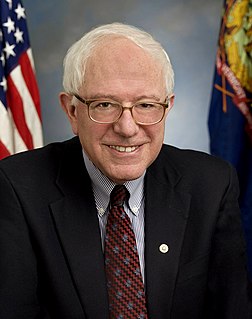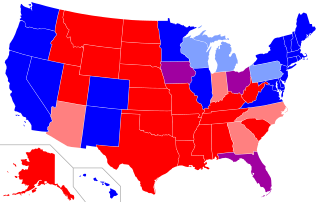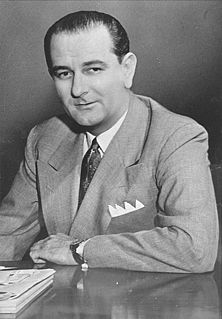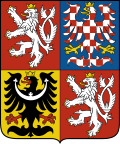
The Christian Democratic Union of Germany is a Christian democratic and liberal-conservative political party in Germany. It is the major catch-all party of the centre-right in German politics. The CDU forms the CDU/CSU grouping, also known as the Union, in the Bundestag with its Bavarian counterpart the Christian Social Union in Bavaria (CSU). The party is widely considered an effective successor of the Centre Party, although it has a broader base.

The Democratic National Committee (DNC) is the formal governing body for the United States Democratic Party. The committee coordinates strategy to support Democratic Party candidates throughout the country for local, state, and national office. It organizes the Democratic National Convention held every four years to nominate and confirm a candidate for president, and to formulate the party platform. While it provides support for party candidates, it does not have direct authority over elected officials.

Bernard Sanders is an American politician who has served as the junior United States Senator from Vermont since 2007. The longest-serving Independent in congressional history, he was elected to the U.S. House of Representatives in 1990 and caucuses with the Democratic Party, enabling his appointment to congressional committees and at times giving Democrats a majority.
In American politics, a superdelegate is an unpledged delegate to the Democratic National Convention who is seated automatically and chooses for themselves for whom they vote. These Democratic Party superdelegates include elected officials and party activists and officials.
Political party strength in U.S. states refers to the level of representation of the various political parties of the U.S. in each statewide elective office providing legislators to the state and to the U.S. Congress and electing the executives at the state and national level.

Since the 2000 United States presidential election, red states and blue states have referred to states of the United States whose voters predominantly choose either the Republican Party (red) or Democratic Party (blue) presidential candidates. Since then, the use of the term has been expanded to differentiate between states being perceived as liberal and those perceived as conservative. Examining patterns within states reveals that the reversal of the two parties' geographic bases has happened at the state level, but it is more complicated locally, with urban/rural divides associated with many of the largest changes.

The 1954 United States Senate elections was a midterm election in the first term of Dwight D. Eisenhower's presidency. Eisenhower's Republican party lost a net of two seats to the Democratic opposition. This small change was just enough to give Democrats control of the chamber with the support of an Independent who caucused with them.

The Legislature of Guam is the law-making body for the United States territory of Guam. The unicameral legislative branch consists of fifteen senators, each serving for a two-year term. All members of the legislature are elected at-large with the island under one whole district. After the enactment of the Guam Organic Act in 1950, the First Guam Legislature was elected composing of 21 elected members. Today, the current fifteen-member 35th Guam Legislature was elected in November 2018.

The Democratic Party is one of the two major contemporary political parties in the United States, along with the Republican Party. Tracing its heritage back to Thomas Jefferson and James Madison's Democratic-Republican Party, the modern-day Democratic Party was founded around 1828 by supporters of Andrew Jackson, making it the world's oldest active political party.

The Democratic Party is a social-democratic political party in Italy.
The Louisiana Democratic Party is the affiliate of the national Democratic Party of the United States in the state of Louisiana.

Party divisions of United States Congresses have played a central role in the organization and operations of both chambers of the United States Congress—the Senate and the House of Representatives—since its establishment as the bicameral legislature of the Federal government of the United States in 1789. Political parties had not been anticipated when the U.S. Constitution was drafted in 1787, nor did they exist at the time the first Senate elections and House elections occurred in 1788 and 1789. Organized political parties developed in the U.S. in the 1790s, but political factions—from which organized parties evolved—began to appear almost immediately after the 1st Congress convened. Those who supported the Washington administration were referred to as "pro-administration" and would eventually form the Federalist Party, while those in opposition joined the emerging Democratic-Republican Party.

The 1968 United States elections was held on November 5, and elected members of the 91st United States Congress. The election took place during the Vietnam War, in the same year as the Tet Offensive, the assassination of Martin Luther King, Jr., and the protests of 1968. The Republican Party won control of the presidency and picked up seats in the House and Senate, although the Democratic Party retained control of Congress.

The 2016 Democratic Party presidential primaries and caucuses were a series of electoral contests organized by the Democratic Party to select the 4,051 delegates to the Democratic National Convention held July 25–28 and determine the nominee for President of the United States in the 2016 U.S. presidential election. The elections took place within all fifty U.S. states, the District of Columbia, and five U.S. territories and occurred between February 1 and June 14, 2016.
Democratic socialism is a political philosophy that advocates political democracy alongside social ownership of the means of production, with an emphasis on self-management and democratic management of economic institutions within a market or some form of decentralized planned socialist economy. Democratic socialists espouse that capitalism is inherently incompatible with what they hold to be the democratic values of liberty, equality and solidarity; and that these ideals can only be achieved through the realization of a socialist society. Democratic socialism can be supportive of either revolutionary or reformist politics as a means to establish socialism.

The Democratic Socialists of America (DSA) is an organization of democratic socialist, social democratic and labor-oriented members in the United States.
Centre-left politics or center-left politics, also referred to as moderate-left politics, are political views that lean to the left-wing on the left–right political spectrum, but closer to the centre than other left-wing politics. Those on the centre-left believe in working within the established systems to improve social justice. The centre-left promotes a degree of social equality that it believes is achievable through promoting equal opportunity. The centre-left has promoted luck egalitarianism, which emphasizes the achievement of equality requires personal responsibility in areas in control by the individual person through their abilities and talents as well as social responsibility in areas outside control by the individual person in their abilities or talents.

The 2016 United States presidential election in Florida was won by Donald Trump on November 8, 2016, with a plurality of 49.0% of the popular vote that included a 1.2% winning margin over Hillary Clinton, who had 47.8% of the vote.

The 2016 United States presidential election in California of November 8, 2016 was won by Democrat Hillary Clinton with a 61.7% majority of the popular vote over Republican Donald Trump. California's 55 electoral votes were assigned to Clinton.















